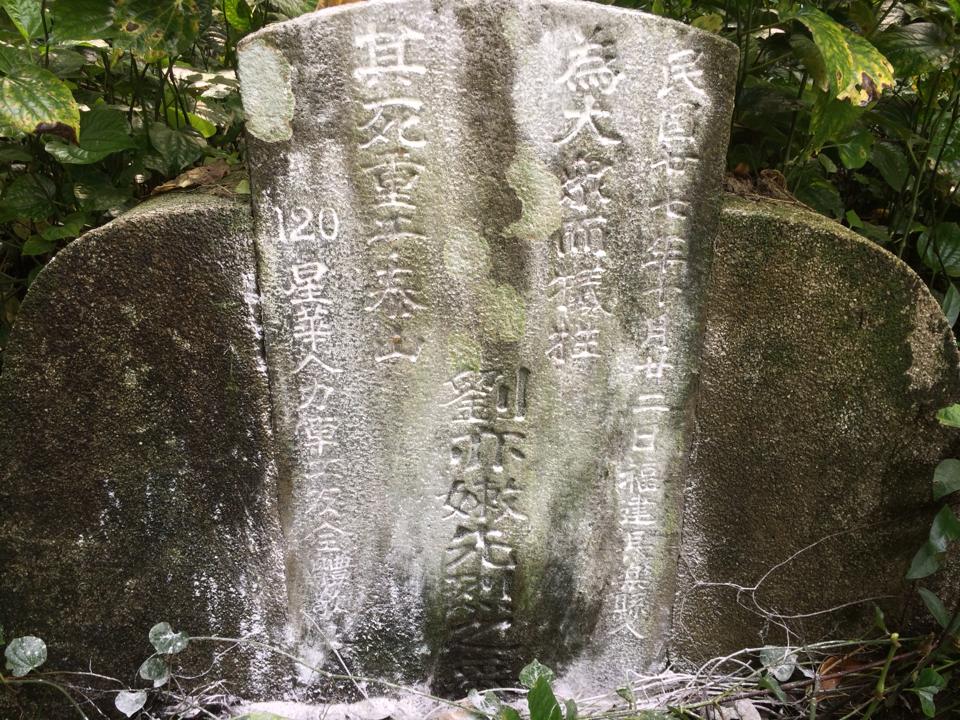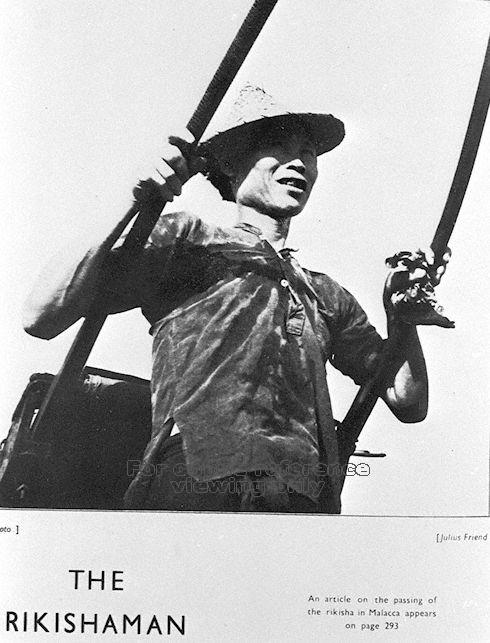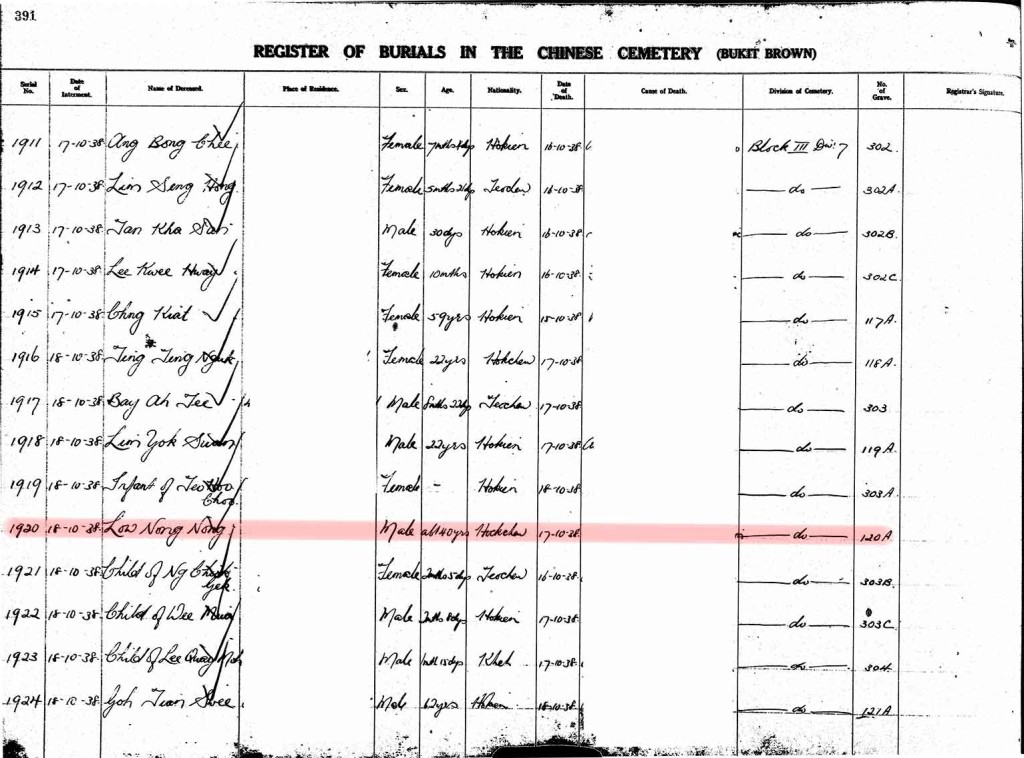The Rickshaw Puller Low Nong Nong
1
Dateline 19 October 2013
The Story of the Rickshaw Pullers Strike and a Man called Low Nong Nong
(compiled with research by Raymond Goh and a Pat Sg, a member of the Facebook Group -Heritage Singapore Bukit Brown Cemetery)
Today, Raymond Goh located the tomb of rickshaw puller Low Nong Nong who died during a confrontation between striking rickshaw pullers and the police. In the clash which occurred on 17th October 1938, Nong Nong lost his life, and there were no witnesses to his death.
The rickshaw pullers were striking for lower rents of their rickshaws from the owners.
“EXCERPT: {{{ Low Nong Nong was found dying from a fractured skull, face down on the side of the street emptied of his comrades. His death sent reverberations through the rickshaw districts, making pullers more determined than ever to force the owners to come to an agreement on their terms.”
“His funeral the same day was an unnerving, demonstrable display of strength and solidarity. Three thousand men solemnly followed the lorry bearing his coffin to BUKIT BROWN CEMETERY to a pauper’s grave, and, as the police anxiously stood by and watched, one of the longest funeral processions in Singapore’s recent history, stretching from Wajang Satu to Newton Circus, passed.” (Source: Rickshaw Coolie: A People’s History of Singapore, 1880-1940)
The community of rickshaw pullers saw Low Nong Nong as a martyr to their cause. On his tomb his epithet reads:
He died for the public, his death is as heavy as Taishan, tomb erected by his fellow rickshaw pullers
“Taishan” in this case is 泰山, Mt Tai, one of the sacred mountains of China. (from Jason Kuo)
Background to the rickshaw pullers strike : The Lot of the Coolie
Many rickshaw pullers had been on prolonged strike during that period (04 Oct – 15 Nov 1938), & thus had no earnings. Low Nong Nong himself died on 17 Oct 1938 — penniless & w/o any kin in Singapore.
The community of rickshaw pullers had been periodically unemployed from 1928 onwards & throughout the post-Depression 1930s. During this period, the colonial govt had been reducing the no. of rickshaw licenses so as to encourage the use of the motorcar.
In response, profit-seeking rickshaw fleet owners (the “siong thau”) took the opportunity to hike up the rental fees. Fleet owners also made rickshaw pullers contribute part of their earnings to the mandatory “China Relief Fund”, which purportedly assisted countrymen who were suffering “deep water and scorching fire” back in China.
Low Nong Nong was probably described as a martyr by his rickshaw brethren, because:-
Despite being hungry & desperately in need of money, he dutifully observed the rickshaw strike, as previously agreed upon amongst the pullers at the 小坡 (xiǎo pō, “Small Town”) area of town.
He lost his life while participating in a rescue group that had attempted to free a Hockchew rickshaw puller, who was arrested by the police during an earlier confrontation at around 11am on 17 Oct 1938.
Background on the incident : The Betrayal
The morning altercation had occurred because Low Ah Law, a Henghua puller, had unilaterally disregarded the rickshaw strike, & blatantly plied his rickshaw on the streets of 小坡 (“Small Town”) — ie. the side of Sg River where most of the rickshaw pullers were supportive of the ongoing rickshaw strike.
Subsequently, the Henghua puller was confronted & restrained by a “Hockchew crowd” of fellow rickshaw pullers at Victoria Street. The police intervened & one of the Hockchew pullers was consequently arrested.
The “rescue” clash between the Hockchew rickshaw pullers & the police occurred during the afternoon of the same day at the junction of Arab & Victoria Streets. Police reinforcements were deployed & “strong-arm measures” were used to subdue the angry “rescuers”.
It was in this clash that Low Nong Nong was found lying face-down & dying from a broken skull on a street that had been cleared out by the police.
In a sense, Low Nong Nong — who was already famished & simply getting by his day — died alone on a street at 小坡 (“Small Town”), because a fellow 小坡 & Foochow prefecture rickshaw puller had betrayed his brethren by not observing the strike.
Meanwhile, the 大坡 (“Big Town”) rickshaw pullers (including the majority Hokkiens) — who had refused to support the strike — merely looked the other way.
* Account of Low Nong Nong’s death on the afternoon of 17 Oct 1938 from ‘Rickshaw Coolie: A People’s History of Singapore, 1880-1940’ (James Francis Warren): http://goo.gl/E7PEif
EXCERPT: {{{ Unemployed, hungry, and desperately in need of money, [Hockchew puller Low Nong Nong] had visited Seah Toon Tan, a Hockchew friend, that morning. He borrowed a dollar from him and left his house in Geylang at about 9 am, without ever having discussed the strike.
The trouble leading up to his death began when a crowd attempted to restrain a Hengwah, Low Ah Law, who had ventured along Arab Street with his rickshaw. At the junction of Victoria Street he was assaulted by a Hockchew crowd.
Police had barely arrived in time to rescue Low Ah Law and arrest one of the assailants. At once, a new crowd of around 400 began to take shape to rescue the captured puller.
Some were armed with fighting sticks, rickshaw shafts, bottles and bricks, and among them was Low Nong Nong. A clash ensued with the police. Shouts of “pah, mata, pah” (“strike, police, strike”) rent the air, as the crowd of pullers slowly closed in, injuring several constables with wooden clogs, poles and stones they hurled at them.
The situation was desperate with police injured and rickshaws wrecked all over the adjacent streets, until reinforcements arrived. Strong-arm measures were used to control and eventually disperse the crowd. Low Nong Nong was found dying from a fractured skull, face down on the side of the street emptied of his comrades. }}}

books.google.com.sg
Low Nong Nong can be found in blk 3, Div 7, no. 120A @ the pauper’s section (on a hillock about 200 meters from the tombkeepers shed at the foot of Ong Sam Leong family cluster)
s




Rest in Peace Mr Low, though it has been 75 years since you passed, I can imagine the pain of working far away from home without any kith and kin along with hard labour just to live.
Regards
Leong